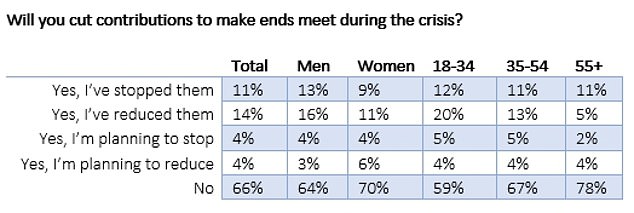Men and younger workers are more likely to shun pension saving during the jobs upheaval triggered by the Covid-19 pandemic
- Some 14% of people have cut their contributions, and 11% stopped them
- A further 8 per cent may take one of these actions in future
- Men and younger workers are at more risk of damaging retirement prospects
A quarter of savers have stopped or cut back on paying into their pensions during the Covid-19 crisis and more are considering doing so, new research reveals.
Men and younger workers are more likely to shun pension saving to make ends meet than women and older workers in response to the upheaval in jobs and personal finances caused by the pandemic, the study shows.
The findings from Hargreaves Lansdown echo a separate survey, which found many people are pausing or reducing contributions because they need money for essential spending, were made redundant or were furloughed.

Covid-19 crisis: Men and young workers are more likely to shun pension saving to make ends meet
Some 14 per cent of people have cut their contributions, and 11 per cent have cut them entirely, while 8 per cent may do so in future, according to the latest survey of 2,000 adults in September.
The trend could cause serious damage to people’s retirement prospects as they wind up with smaller pots, but auto-enrolment comes with a failsafe.


(Source: Hargreaves Lansdown)
Employers must re-enrol staff who leave once every three years, unless they choose to stay opted out.
But employers do this on their own schedule, usually on a rolling basis starting from when they first introduced auto enrolment, not timed on when a worker dropped out.
Sarah Coles, personal finance analyst at Hargreaves Lansdown, says younger people may be quicker to stop contributions because their pension feels like a more distant consideration, so it is an easy cost to cut.
But she points out that the money you put in when you’re younger works the hardest for you – because compound growth boosts pots more over longer periods – so this will come at a higher cost than they expect.
Coles adds that if you cut back or stopping paying into a pension the impact will also be magnified, because you lose pension tax relief from the government and free cash from your employer too.
Who pays what: Breakdown of minimum contributions under auto-enrolment


How pension contributions stack up under auto-enrolment schemes (Source: The Pensions Advisory Service)
But she acknowledges that if you are now on a lower income, have cut out luxuries and shopped around to minimise the cost of essentials and are still struggling, then you may need to pause pension contributions.
‘The good news is that the way that automatic enrolment works should stop temporary pauses in payments becoming enormous gaps,’ says Coles.
‘If you opt out of a workplace pension, you will automatically be put back in after three years, so even if you don’t get round to kick-starting payments yourself, you’re likely to accidentally do the right thing.’
Meanwhile, Coles says some people will have seen their pension funds drop in value due to big market falls early in the Covid-19 crisis, but some are well ahead of where they started the year, depending on where they are invested.
‘Most pensions aren’t just invested in equities either. Most will have a balance of different assets, so overall pension funds didn’t fall as far, and have recovered significantly,’ she says.
‘By the end of June, according to Moneyfacts, the average pension fund was only 4.4 per cent down from the start of the year.
‘It’s worth taking a look at where your pension is invested, and how it is performing, not just to see how it’s doing, but to be certain it reflects your aims and objectives.
‘If you have a workplace pension and you’re not sure how to do this, talk to your HR department, and ask them to send you details.’
Read our guide to checking if your work pension is up to scratch here.
